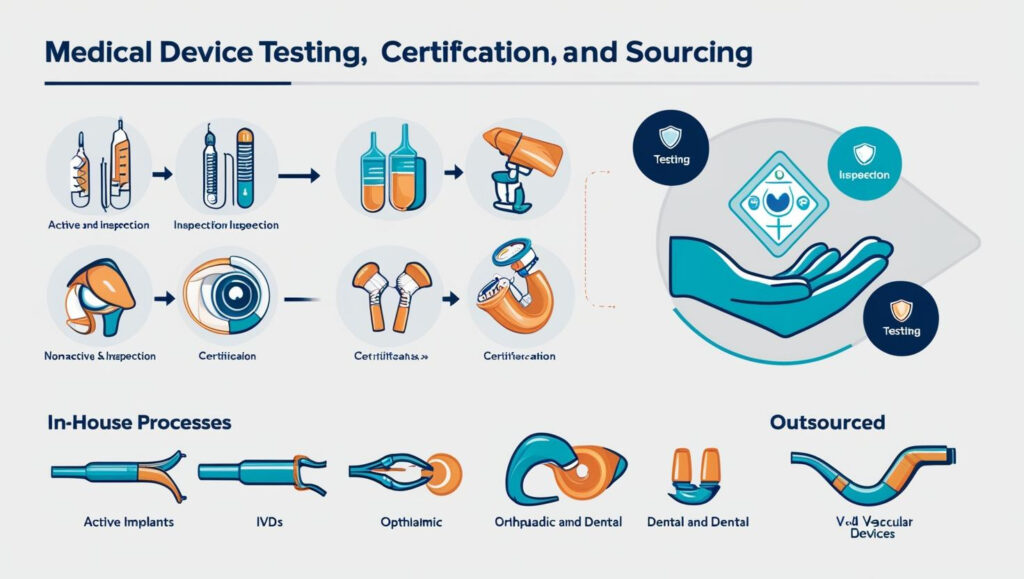The medical device testing market is witnessing a transformative phase, driven by rapid technological advancements, growing regulatory demands, and the increasing complexity of medical devices. As healthcare systems around the world embrace innovation, the testing industry must adapt to ensure safety, reliability, and compliance with ever-evolving standards. This article delves into the future trends shaping the medical device testing market and the emerging technologies that are revolutionizing the industry.
Download PDF Brochure @ https://www.marketsandmarkets.com/pdfdownloadNew.asp?id=254474064

Growth Drivers in the Medical Device Testing Market
Several factors are propelling the growth of the medical device testing market:
- Rising Demand for Advanced Medical Devices: Innovations in medical technology, including wearable devices, robotic-assisted surgical systems, and connected healthcare solutions, have heightened the need for rigorous testing to ensure safety and functionality.
- Stringent Regulatory Requirements: Regulatory agencies worldwide are imposing stricter guidelines to ensure the quality and safety of medical devices. Adherence to these regulations is critical for market entry and commercialization.
- Global Expansion of Healthcare Services: Emerging markets are witnessing significant investments in healthcare infrastructure, increasing the demand for medical device testing services to cater to regional needs.
- Focus on Patient-Centric Care: The shift toward personalized medicine and home healthcare solutions has introduced new categories of medical devices, requiring specialized testing protocols.
Emerging Technologies in Medical Device Testing
The integration of cutting-edge technologies is transforming the medical device testing landscape, enabling faster, more accurate, and comprehensive evaluations. Key emerging technologies include:
- Artificial Intelligence (AI) and Machine Learning: AI-driven algorithms are revolutionizing the testing process by enabling predictive analytics, anomaly detection, and automated data analysis. These capabilities reduce testing time and enhance accuracy.
- Internet of Things (IoT): With the rise of connected devices, IoT technologies are being utilized to test interoperability, data security, and real-time performance of smart medical devices.
- 3D Printing: The use of 3D printing for prototyping medical devices has expedited the testing phase. This technology allows for the creation of customized models for performance evaluation.
- Digital Twins: Digital twin technology creates virtual replicas of medical devices, enabling manufacturers to simulate performance, identify potential issues, and refine designs before physical testing.
- Blockchain for Data Integrity: Blockchain technology is emerging as a solution for ensuring data transparency and security during the testing and certification processes.
Trends Shaping the Future of Medical Device Testing
- Increased Automation: Automation is reducing human errors and improving efficiency in testing procedures. Robotic systems and automated testing tools are becoming essential in handling complex devices.
- Focus on Cybersecurity Testing: As medical devices become more connected, ensuring robust cybersecurity has become a top priority. Testing now includes assessing vulnerabilities to protect sensitive patient data and device functionality.
- Regulatory Harmonization: Efforts to standardize global regulatory frameworks are gaining momentum, simplifying the testing process for manufacturers seeking to market devices across multiple regions.
- Sustainability in Testing: The adoption of eco-friendly testing methods and materials is aligning the medical device industry with global sustainability goals.
- Remote Testing and Validation: The rise of telemedicine and remote healthcare solutions has prompted the development of remote testing protocols to evaluate devices used in non-clinical settings.
Challenges and Opportunities
While the future of the medical device testing market looks promising, it is not without challenges. The high cost of advanced testing technologies, the complexity of regulatory landscapes, and the need for skilled professionals are significant hurdles. However, these challenges also present opportunities for innovation, collaboration, and investment in R&D.
The medical device testing market is poised for significant growth, driven by technological advancements and the increasing demand for innovative healthcare solutions. Emerging technologies such as AI, IoT, and digital twins are reshaping the industry, making testing more efficient and comprehensive. As the industry navigates challenges and embraces new trends, it will play a pivotal role in ensuring the safety, efficacy, and reliability of medical devices, ultimately contributing to improved patient outcomes and advancing global healthcare.